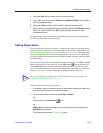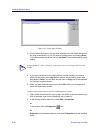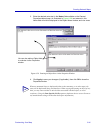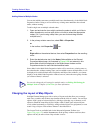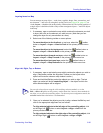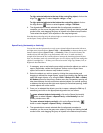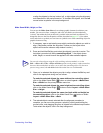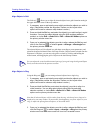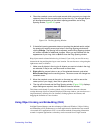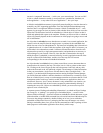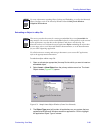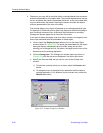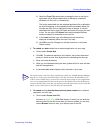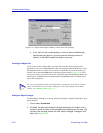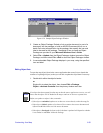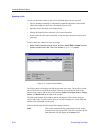
Customizing Your Map 6-47
Creating Network Maps
4. Place the crosshair cursor on the spot around which you want your ring to be
centered, then click the mouse button to place the ring. The selected objects
will be aligned according to the default spacing parameter, and a Ring
Spacing window, Figure 6-30, opens.
Figure 6-30. The Ring Spacing Window
5. If the default spacing parameter does not produce the desired results, adjust
the spacing by entering a new pixel value in the Ring Spacing window and
clicking Change. The spacing will be adjusted, and the Ring Spacing window
will remain available for additional changes. When you are satisfied with the
appearance of your ring, click on Quit to close the Ring Spacing window.
Ring objects remain selected after the ring is formed; if you wish, you can click on any
element in the ring and drag the ring to a new location. You can also move a ring using the
right-mouse menu, as follows:
1. Make sure all objects in the ring (or all objects you want to include in the ring)
are selected; if they’re not, use the mouse to select them.
2. Right-click the mouse button on any of the selected elements, and select
Move\Create Ring from the resulting menu. The arrow cursor will change to a
crosshair cursor.
3. Move the crosshair cursor to the point on the map you wish to use as the
center point of your ring(s), then click to place the ring.
4. The ring will be formed and the Ring Spacing window (Figure 6-30,) displays;
adjust settings as required, then click Quit to close the window.
This feature can be handy if you have placed a ring in a location where its elements
overlap other map objects or cannot be displayed in the map window; you can also move a
ring formation by selecting all of its elements, clicking again on one element, and
dragging the formation to a new location.
Using Object Linking and Embedding (OLE)
NetSight Element Manager can take advantage of Microsoft Windows’ Object Linking
and Embedding (OLE) architecture as a client application for data that has been created
via external server applications. OLE is a convenient method of integrating information
created via separate applications so that they can be accessed from a single location



